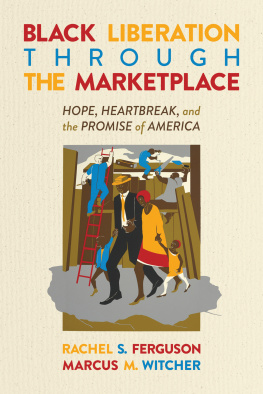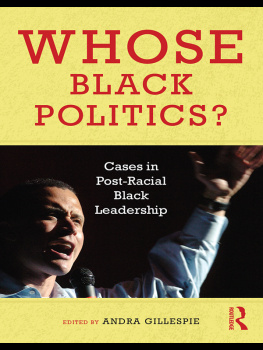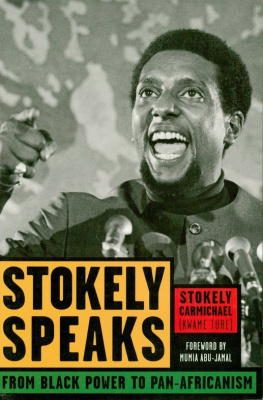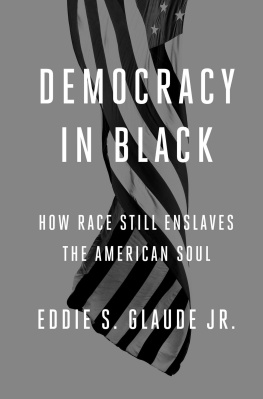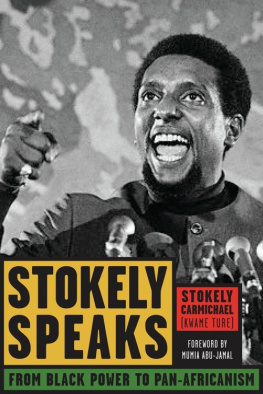Table of Contents
Guide
An EMPANCIPATION BOOKS BOOK
An Imprint of Post Hill Press
ISBN: 978-1-63758-344-9
ISBN (eBook): 978-1-63758-345-6
Black Liberation Through the Marketplace:
Hope, Heartbreak, and the Promise of America
2022 by Rachel S. Ferguson and Marcus M. Witcher
All Rights Reserved
Cover design by Cody Corcoran
Cover art: 2021 The Jacob and Gwendolyn Knight Lawrence Foundation, Seattle / Artists Rights Society (ARS), New York
No part of this book may be reproduced, stored in a retrieval system, or transmitted by any means without the written permission of the author and publisher.

Post Hill Press
New York Nashville
posthillpress.com
Published in the United States of America
This book is dedicated to the thinkers, lawyers, entrepreneurs, teachers, and artists who insisted in the face of crushing obstacles that America is for Black people too. Phillis Wheatley, Lysander Spooner, Frederick Douglass, Booker T. Washington, Oswald Garrison Villard, John H. Johnson, Madame C.J. Walker, Rose Wilder Lane, Zora Neale Hurston, T.R.M. Howard, Nat Hentoff, Stanley Crouch, Albert Murray, and so many others. May their dream never die.
A t a recent visit to the International Civil Rights Center & Museum in Greensboro, North Carolina, Rachel was struck by the opening image depicting a beautiful hand-sewn American flag with the words of Thomas Jeffersons Declaration superimposed: We hold these truths to be self-evident, that all men are created equal, that they are endowed by their Creator with certain unalienable rights, that among these are life, liberty, and the pursuit of happiness. The tour guide, a stunning older Black lady named Robin with dreadlocks down to her knees, then pressed a button and the image changed, with the faint shadow of the flag behind, to images of slave auction signs and whites-only, no-colored-allowed signs. Robin spoke of the unfulfilled promise of the Declaration as she led the group through the dreadful review of Black lynching, economic exclusion, school segregation, and the many of other forms that Jim Crow took. After letting the group view a copy of a Green Book (the secret travel guides that Black Americans used to navigate the Jim Crow South), Robin declared that our answer to the racism and segregation that we experienced was entrepreneurship. She then listed dozens of Black inventions, walked the group through a room full of images of Black businesses, banks, newspapers, and churches. This storythe story of a high ideal, often unrealized but still inspiring, and a struggle for independence and economic poweris the story of Black liberation through the marketplace.
As Americans, addressing past racial injustices and ensuring that the promises of our founding are extended to every citizen are of the utmost importance. Jefferson accused the British of a long train of abuses, and the Black experience in America has certainly been that. We have a duty to understand this and to address these injustices to whatever extent possible. Our political culture, however, often undoes such efforts.
Tribalism. Polarization. Contempt. This reality haunts the American conversation. The Right blames the Lefts identity politics. The Left blames Trump. Trump blames the media. Experts blame smartphones, social media, and the twenty-four-hour news cycle. Whatever the cause, unless you are an apolitical digital minimalist or in a coma, youre feeling the pressure to take a side. And you also cant avoid the fact that many (though not all) of our most contentious cultural and political conversations revolve around issues of racial justice.
Fair enough. Our social and political disputes are real, and they matter. There are right and wrong answers to the pressing questions of the day. The problem is not that we are incapable of thinking through difficult cultural and policy issues. Rather, the problem is a phenomenon we will call bundling. Taken together, bundling positions on a wide variety of issues in order to form a party is just too hard to resist.
Unfortunately, reality doesnt actually conform to the traditional political platforms, and often positions are bundled together that dont necessarily follow from the same principles. Thats just one reason why we argue here that we cannot fruitfully address issues of racial justice without first committing ourselves to a process of unbundling. We also argue that various details of Black American life and history make racial justice a particularly bad fit for politics as usual in America. The Black American experience does not fit well into majority cultures political categories, and its not right to try to make it fit. Here, we take a classical liberal approach to the history of Black oppression in America because we think it offers insights that are often overlooked: a kind of third way that breaks out of a stultifying two-sided conversation. Nor have classical liberals themselves done a great job of communicating with the public how a philosophy that limits government to a defense of individual rights, encourages markets, and values civil society can speak into the lives of Black Americans in a powerful way. And yet, we think that it can and that it does. Finally, we think that Black American culture overlaps with classical liberal values in ways that ought to be explored more. We hope to begin the process of addressing this failure in our ranks with this work.
In this book, well be taking a look at certain episodes in Black history here in America, including several truly stunning stories of Black success. We pick out several episodes in which the state excluded Blacks from the institutions that underlie healthy economic activity, just as progressive scholars have highlighted. We pick out other episodes in which state intervention on behalf of Blacks (and other marginalized groups) has undermined their economic and cultural flourishing, just as conservative scholars have argued. We make some surprising and counterintuitive discoveries along the way that dont fit either narrative very well. We suggest that certain practical policy changes and cultural shifts that address the root causes of marginalization can do more to address the pain of our past than many on-the-nose solutions on offer.
We want to show that neither political tribe has a very good grasp on Americas racial situation and that this distorts our understanding of American history as well. We offer an alternative accountone that takes the truest insights from both conservative and progressive scholars but is also willing to jettison the elements of their accounts that have misled their supporters. Research shows that most Black Americans dont fit comfortably in either camp, anyway, so it makes sense to reframe and reorient our account of the Black experience.
We anticipate that our readers will experience this book as a bit of a roller-coaster ride. You might find yourself quite comfortable with the claims in one chapter but deeply anxious about those in the next. We hope youll stick with us and perhaps even experience something weve come to enjoya sense of freedom gained by a certain distance from the demands of political tribes. Maybe this sort of approach could generate a tribe of its own!
We open the reframing project with a discussion of the terms classical liberalism and social justice as they each relate to the Black American experience. Classical liberalism captures Americas dedication to four distinct institutions: property rights (including the right to bodily integrity), freedom of contract, equal protection under the law, and a cultural affirmation of trade and entrepreneurship. The great classical liberal F. A. Hayek famously critiqued the term social justice. While we find his critique of the term as he understands it successful, we argue that its meaning has broadened to include some principles that classical liberals can affirm, and frankly always have affirmed. Many of the historical injustices against Black Americans (which we discuss in detail in later chapters) can only be understood as violations of the very institutions that Hayek requires as the foundation for a successful social and economic order. So classical liberalism can and should have a good grasp on the significance of historical, systemic injustices for flourishing now. At the same time, Hayeks famous idea of the information problem helps us to avoid ineffective solutions and move toward more productive approaches to how historical injustices can truly be made right. We deal with solutions at the end of the chapters that are particularly relevant to that strategy, such as addressing transitional justice at the end of the chapter on atrocities against Black Americans, or addressing criminal justice reform at the end of the chapter on the drug war and mass incarceration.

